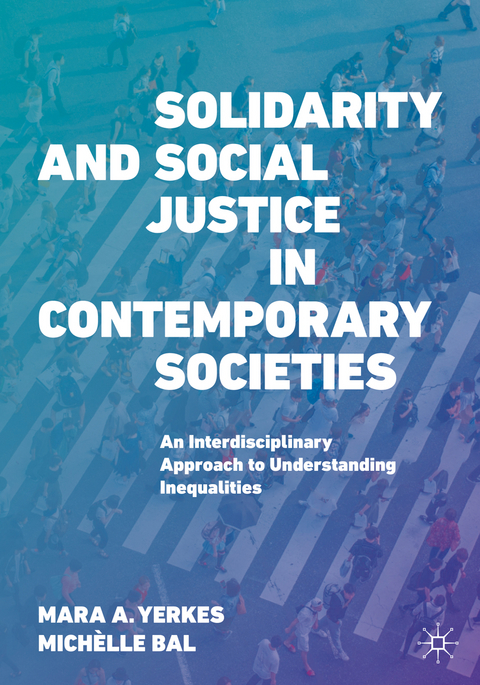
Solidarity and Social Justice in Contemporary Societies
Springer International Publishing (Verlag)
978-3-030-93794-2 (ISBN)
Mara A. Yerkes is Associate Professor of Interdisciplinary Social Science at the Department of Interdisciplinary Social Science, Utrecht University, the Netherlands.
Michèlle Bal is working as an Assistant Professor in Interdisciplinary Social Science at Utrecht University.
Section I Introduction. 1 Why Solidarity and Social Justice Still Matter Today.- Introduction.- Key Concepts in the Book.- Outline of the Book.- Glossary.- References.- Section II Theoretical Perspectives on Solidarity and Social Justice.- 2 Who We Are and Who We Choose to Help (or Not): An.- Introduction to Social Identity Theory.- Introduction.- A Brief Introduction to Social Identity Theory.- How Can Social Identities Encourage Intergroup Animosity and Resistance to Social Change?.- How Can Social Identities Facilitate Intergroup Solidarity and Social Change?.- Conclusion.- Glossary.- References.- 3 Understanding Solidarity in Society: Triggers and Barriers for In- and Outgroup Solidarity.- Introduction.- Forms of Solidarity: To Whom Do We Owe?.- Social Justice: What Do We Owe?.- Macro-/Meso-level Solidarity: Sociological Ideas About Social Justice and Solidarity.- Micro-level Solidarity: Psychological Ideas on Solidarity.- Conclusion: Social Justice and Solidarity.- Glossary.- References.- 4 Social Justice and the Justification of Social Inequalities.- Introduction.- What Is a Just Distribution of Burdens and Benefits?.- How Can We Create a Just Decision-Making Process?.- Who Is Included in Our Justice Judgments?.- How Do People Justify Injustice and Inequalities?.- Conclusion.- Glossary.- References.- 5 The Philosophy of Social Justice and Welfare Provision: Towards Capacitating Solidarity.- Introduction.- The Good Polity: From T.H. Marshall to John Rawls.- The Good Life: From the Means of Economic Security to the Ends of Human Flourishing.- 'Stepping-Stone' Solidarity to Complement 'Robin Hood' and 'Piggy-Bank' Social Security.- Conclusion: The Correlates of the Good Life in the Good Polity.- Glossary.- References.- 6 Who Should Get What and Why? Insights from Welfare Deservingness Theory.- Introduction.- The Welfare Deservingness Model.- Individual and Contextual Differences in Deservingness Opinions.- Conclusion.- Glossary.- References.-Section III An Empirical Overview of Social Inequalities Across Societal Fault Lines.- 7 Gender Stereotypes: What Are They and How Do They Relate to Social Inequality?.- Introduction.- Where Do Gender Stereotypes Come From and How Are They Reinforced?.- Gender Stereotypes and Social Inequality.- Promoting Gender Equality.- Conclusion.- Glossary.- References.- 8 Gender Inequality: Perceptions of Fairness and Justice.- Introduction.- Gender Inequality in Housework, Care Work, and Paid Employment.- A Social Justice Framework for Understanding Gender Inequality.- Empirical Example: Accepting Unfair Arrangements at Work.- Conclusion.- Glossary.- References.- 9 Modern Ageism and Age Stereotyping.- Introduction.- Age-Related Stereotypes.- Stereotype Origins.- Consequences of Stereotypes.- Countering Modern Ageism.- Conclusion.- Glossary.- References.- 10 Is the Intergenerational Social Contract Under Pressure?.-Studying Age Cleavages in Attitudes Towards Government Support for the Young andthe Old.- Introduction.- Age and Attitudes Towards Welfare Provision for the Young and the Old.- Data and Methodology.- Conclusion.- Glossary.- References.- 11 How to Study and Understand Socioeconomic Inequalities in Health.- Introduction.- Defining and Measuring Socioeconomic Position.- Intersectionality, Self-Perceived SEP, and Stereotypes.- Consequences of SEP for Health and Well-Being.- Battling Socioeconomic Inequalities in Health and Well-Being.- Conclusion.- Glossary.- References.- 12 Deservingness and Socio-Economic Cleavages.- Introduction.- Deservingness theory and Socio-Economic Differences.- Deservingness perceptions in Slovenia and Germany.- Conclusion.- Glossary.- References.- 13 They Take Away Our Jobs! They Undermine Our National Culture! Public Perceptions of Immigrants and Their Consequences for Solidarity Across Ethnic Boundaries.- Introduction.- Are They Friendly and Competent? Stereotypes of Immigrants.- Stereotypes as Barriers for Inter-Ethnic Solidarity in the Context of Immigration.- Host Society Members' Perceptions of Economic and Cultural Threats.- Threat Perceptions as Barriers for Host Society's Solidarity with Immigrants.- Conclusion.- Glossary.- References.- 14 Welfare Chauvinism: Are Immigrants Granted Access to Welfare State Benefits?.- Introduction.- Welfare Chauvinism in Relation to the Welfare Deservingness Literature.- Explanations of Welfare Chauvinism.- Incidence of Welfare Chauvinism.- Welfare Chauvinism: EU Versus Non-EU Immigrants and Different Welfare State Domains.- Immigrants Themselves on Welfare State Access.- Conclusion.- Glossary.- References.- 15 Sexual Orientation as Social Justice Fault Line: The Role of Stigmatised Identities and Minority Community Solidarity in Social Inequalities in Wellbeing.- Introduction.- Social Inequality Affecting Lesbian, Gay and Bisexual People.- Social Stigma, Minority Stress and Wellbeing of LGB People.- Solidarity to Achieve Social Justice for LGB People.- Conclusion.- Glossary.- References.- 16 Perceptions of Deservingness: Civil and Social Rights for Same-Sex Families.- Introduction.- Civil and Social Rights of Same-Sex Families Within the EU: The Debate.- The Current Study: Data and Methods.- Results.- Civil and Social Rights of Citizens Who Move Within the EU.- Conclusion.- Glossary.- References.- Section IV Global Challenges to Solidarity and Social Justice.- 17 Leaving No One Behind: Climate Change as a Societal Challenge for Social Justice and Solidarity.- Introduction.- Environmental Justice in Reaction to Climate Change.- Individual Behaviour in Climate Change Mitigation.- Beyond the Motivation for Sustainable Behaviour.- Sustainability Transitions: Challenges for Solidarity and Social Justice.- Glossary.- References.- 18 Digitalisation of Public Services as a Challenge to Social Justice.- Introduction.- Digitalisation of Public Services Provision.- Social Justice and the Digital Divide.- Conclusion.- Glossary.- References.- 19 The Covid-19 Pandemic and Societal Challenges to Solidarity and Social Justice: Consequences for Vulnerable Groups.- Introduction.- Inequalities in the Prevalence and Severity of COVID-19.- Inequalities in the Impact of Measures to Curb COVID-19.- Challenges to Solidarity and Social Justice During the Ongoing Pandemic.- Conclusion.- Glossary.- References.- Section V Conclusions.- 20 Understanding Solidarity and Social Justice: Barriers that Remain.- Introduction.- Key Conclusions About Solidarity and Social Justice.- Solidarity, and Social Justice in a Changing World?.- References.
| Erscheinungsdatum | 27.04.2022 |
|---|---|
| Zusatzinfo | XXIII, 223 p. 13 illus. in color. |
| Verlagsort | Cham |
| Sprache | englisch |
| Maße | 178 x 254 mm |
| Gewicht | 478 g |
| Themenwelt | Geisteswissenschaften ► Psychologie ► Psychoanalyse / Tiefenpsychologie |
| Geisteswissenschaften ► Psychologie ► Sozialpsychologie | |
| Sozialwissenschaften ► Pädagogik ► Sozialpädagogik | |
| Sozialwissenschaften ► Politik / Verwaltung | |
| Sozialwissenschaften ► Soziologie ► Spezielle Soziologien | |
| Schlagworte | Class • Gender • Intersectionality • Race • social inqualities • welfare state responses • work inequality |
| ISBN-10 | 3-030-93794-1 / 3030937941 |
| ISBN-13 | 978-3-030-93794-2 / 9783030937942 |
| Zustand | Neuware |
| Haben Sie eine Frage zum Produkt? |
aus dem Bereich


